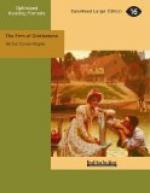Then there was the card-room, whither the Widow Scully and the major and many others of the elders repaired when they found the pace too fast for them. Very snug and comfortable it was, with its square tables, each with a fringe of chairs, and the clean shining cards spread out over their green baize surfaces. The major and his hostess played against Captain Livingstone Tuck and an old gentleman who came from Lambeth, with the result that the gallant captain and his partner rose up poorer and sadder men, which was rather a blow to the former, who reckoned upon clearing a little on such occasions, and had not expected to find himself opposed by such a past master of the art as the major. Then the veteran and another played the hostess and another lady, and the cunning old dog managed to lose in such a natural manner, and to pay up with such a good grace, and with so many pretty speeches and compliments, that the widow’s partner was visibly impressed, a fact which, curiously enough, seemed to be anything but agreeable to the widow. After that they all filed off to supper, where they found the dancers already in possession, and there was much crushing and crowding, which tended to do away with ceremony and to promote the harmony of the evening.
If the major had contrived to win favour from Mrs. Lavinia Scully in the early part of the evening, he managed now to increase any advantage he had gained. In the first place he inquired in a very loud voice of Captain Tuck, at the other end of the table, whether that gentleman had ever met the deceased Major-General Scully, and being answered in the negative, he descanted fluently upon the merits of that imaginary warrior. After this unscrupulous manoeuvre the major proceeded to do justice to the wine and to indulge in sporting reminiscences, and military reminiscences, and travelling reminiscences, and social reminiscences, all of which he treated in a manner which called forth the admiration of his audience. Then, when supper had at last been finished, and the last cork drawn and the last glass filled, the dancers went back to their dance and the card-players to their cards, and the major addressed himself more assiduously than ever to the pursuit of the widow.
“I am afraid that you find the rooms very hot, major,” she remarked.
“They are rather hot,” he answered candidly.
“There is a room here,” she said, “where you might be cooler. You might have a cigarette, too. I meant these rooms as smoking-rooms.”
“Then you must come, too.”
“No, no, major. You must remember that I am the hostess.”
“But there is no one to entertain. They are all entertaining each other. You are too unselfish.”
“But really, major—”
“Sure you are tired out and need a little rest.”
He held the door open so persuasively that she yielded. It was a snug little room, somewhat retired from the bustle, with two or three chintz-covered chairs scattered round it, and a sofa of the same material at one side. The widow sat down at one end of this sofa, and the major perched himself at the other, looking even redder than usual, and puffing out his chest and frowning, as was his custom upon critical occasions.




